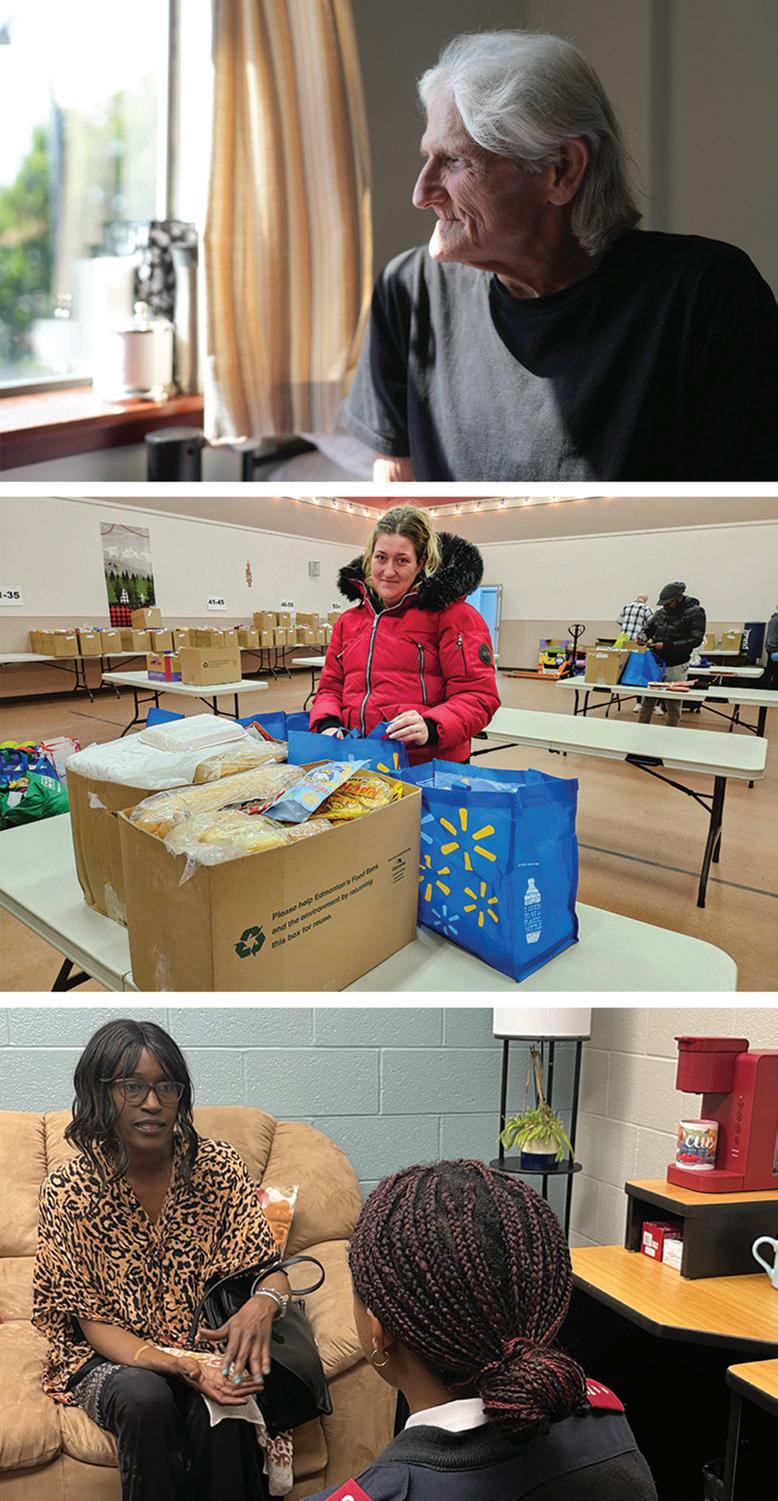

PHRASE BE is an ongoing series highlighting the dozens of everyday sayings that originate with biblical text.
This month, we unpack:



PHRASE BE is an ongoing series highlighting the dozens of everyday sayings that originate with biblical text.
This month, we unpack:
PHRASE: The writing on the wall.
DEFINITION: To be aware that something bad will probably happen soon.
EXAMPLE: After two bad quarterly reports, the employee could see that the writing was on the wall.
SOURCE: “Suddenly the fingers of a human hand appeared and wrote on the plaster of the wall, near the lampstand in the royal palace. The king watched the hand as it wrote. His face turned pale and he was so frightened that his legs became weak and his knees were knocking.”
—Daniel 5:5-6
In the sixth century BC, Balshazzar, the king of Babylonia, was holding the Jews captive. During a banquet, a mysterious hand appeared, writing on the wall of the king’s palace: mene, mene, tekel, upharsin (numbered, numbered, weighed, divided). The king called upon Daniel, a Jew turned royal advisor, who interpreted it to mean that God intended the king and his kingdom to fall, and his days were numbered. He had been weighed in the balance and found wanting.
Despite appearances, God controls history. And, in time, He’ll prove it.
In a critical and unbelieving world, we can rest assured of God’s presence and protection if we remain faithful to Him, as did Daniel, who, despite tests and punishments, kept his faith intact.

SOMEONE CARES
5 Goals Attained
For players at Anchor of Hope Community Church, soccer is a symbol of hope.
101 8 What Am I Reading?
Learning to read the Bible for all its worth.
Alison sees volunteering at her local thrift store as retirement with a purpose.
When paying rent means skipping meals, The Salvation Army steps in.

16
Through love, marriage, infertility and sickness, Erica and Damian Azak have found a home in each other.
As Ian Knight and his mother navigated her final journey, The Salvation Army was there for them.

This Easter, Snow White is a reminder that one day, our Prince will come.
The Salvation Army’s vocational training programs equip individuals with essential skills that help them enter the employment market.
If you’ve gotten anything by the skin of your teeth, wanted to travel to the four corners of the earth, thought that there’s nothing new under the sun or believed that the love of money is the root of all evil, you might be surprised to find out that you were actually quoting the Bible.
There are dozens of common sayings that originated in the Bible, and it shows how its influence on culture, society and even our everyday language has endured for thousands of years.
Starting this month, we are debuting a new series-“Phrase Be”-on the inside front cover, illustrating Bible phrases that have entered everyday conversation.
This new department nicely complements the second in a three-part series written by Salvation Army pastor Mal Davies on how to read the Bible for all its worth, and how to appreciate the world’s bestselling book.
“Knowing what you’re reading can help you come to grips with its timeless truths and advice,” he says.
Elsewhere in this month’s Faith & Friends, you’ll encounter a remarkable young couple from northwestern British Columbia. Through love and marriage, infertility and sickness, Damian and Erica Azak have found a home in each other. Now leaders at the Salvation Army church in Gitwinksihlkw, their love for each other remains as steadfast as their faith in God.

The Azaks’ love story is on page 16.
Ken Ramstead
Mission Statement
To show Christ at work in the lives of real people, and to provide spiritual resources for those who are new to the Christian faith.
Faith & Friends is published bimonthly by:
The Salvation Army 2 Overlea Blvd, Toronto Ontario, M4H 1P4
International Headquarters 101 Queen Victoria Street, London, EC4P 4EP, England
Lyndon Buckingham, GENERAL
Commissioner Lee Graves
TERRITORIAL COMMANDER
Lt-Colonel John P. Murray
SECRETARY FOR COMMUNICATIONS
Geoff Moulton, DIRECTOR OF INTERNAL COMMUNICATIONS, EDITOR-IN-CHIEF AND LITERARY SECRETARY
Pamela Richardson
ASSISTANT EDITOR-IN-CHIEF
Ken Ramstead, EDITOR
Kristin Ostensen
MANAGING EDITOR OF SALVATIONIST AND SALVATIONIST.CA
Lisa Suroso
GRAPHIC DESIGN SPECIALIST
Emily Pedlar
JUNIOR GRAPHIC DESIGNER
Rivonny Luchas
DIGITAL MEDIA SPECIALIST
Giselle Randall
SENIOR EDITOR OF SALVATIONIST
Abbigail Oliver
EDITOR OF JUST FOR KIDS AND STAFF WRITER
Logan Graves CIRCULATION CO-ORDINATOR
Scripture Unless otherwise indicated, all Scripture references are taken from New International Version
Contact Us P. (416) 467-3188, F. (416) 422-6217
Websites faithandfriends.ca, salvationist.ca, salvationarmy.ca
Email faithandfriends@salvationarmy.ca
Subscription for one year: Canada $17 (includes GST/HST); U.S. $22; foreign $24 P. (416) 422-6153
circulation@ salvationarmy.ca
All articles are copyright The Salvation Army Canada & Bermuda and cannot be reproduced without permission. Publications Mail Agreement No. 40064794 ISSN 1702-0131
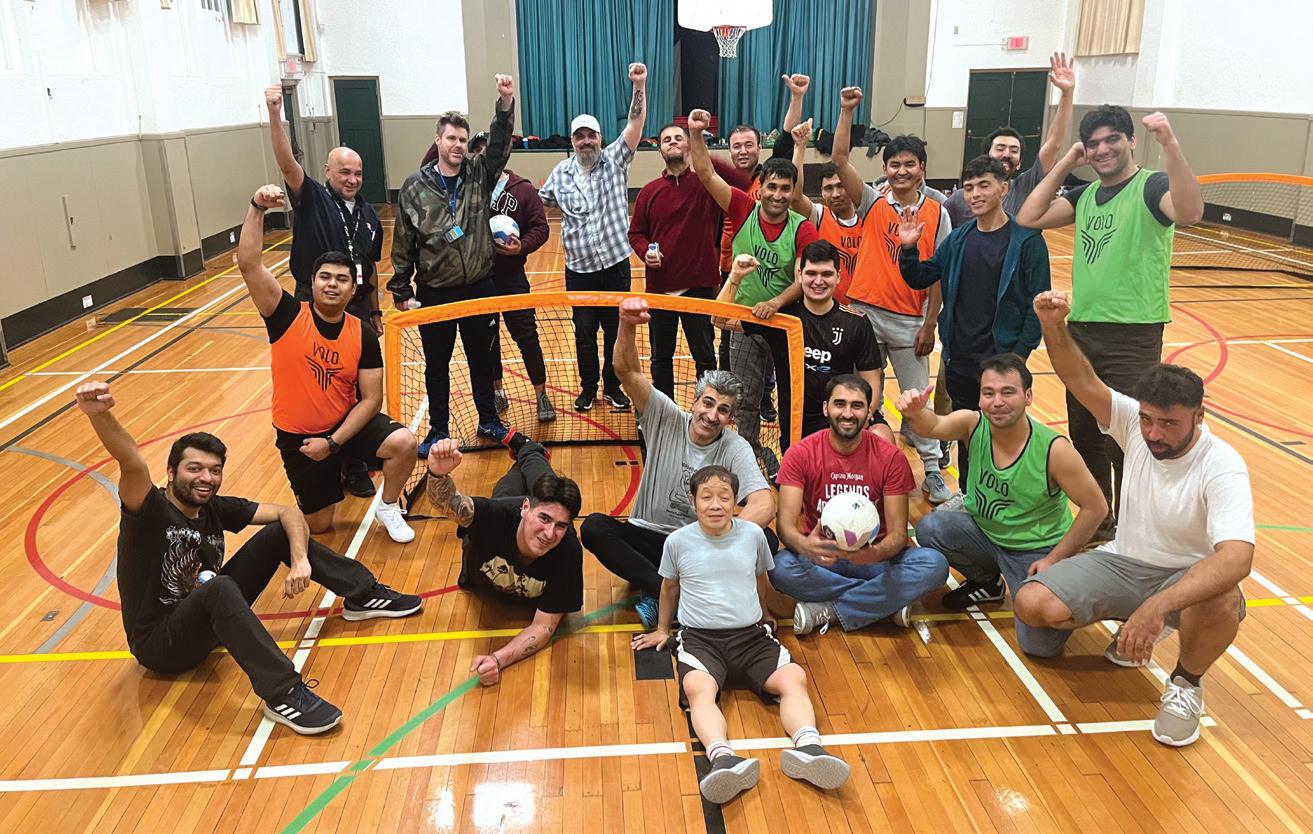
One Kick at a Time
The Salvation Army’s Anchor of Hope Community Church's indoor soccer program in Vancouver helps guide its players toward a future filled with promise
Solace on the Court
For Mohammad Yasin Jamali, a refugee haunted by the echoes of war in his homeland, soccer has become a sanctuary

For the players at The Salvation Army’s Anchor of Hope in Vancouver, soccer is a symbol of hope.
by Giuliano Mendonca
Here, age or skill level doesn’t matter; everyone is welcomed with open arms.
GIULIANO MENDONCA
Soccer, the beautiful game that transcends boundaries and unites people around the world, has become more than just a sport for the community gathered under the caring wings of Captain Carlos Cuellar, a pastor at The Salvation Army’s Anchor of Hope Community Church in Vancouver. His vision, ignited by a profound love for the game and a desire to foster unity, gave birth to an indoor soccer program in 2020.
Five years later, it’s still not about the goals scored or matches won, but about the profound impact it has on the lives it touches.
In the heart of Vancouver’s Downtown Eastside, among the clients of Salvation Army shelters, a diverse tapestry of humanity converges on the soccer field. Captain Carlos, eyes gleaming with hope, describes it as a melting pot of nationalities, where language barriers dissolve in the universal language of soccer. Whether from Afghanistan, Africa, South America or Central America, they find common ground, stitching bonds of camaraderie through every pass and goal.
Yet, challenges to continue the program keep on the mind. The scarcity of space and equipment, the ebb and flow of participants hindered by life’s demands—these are the hurdles they face. But within this arena, hope shines brighter. Here, age or skill level doesn’t matter; everyone is welcomed with open arms. The logistics are handled with care by the members of the church, ensuring that every participant feels valued and supported.
Each kick of the ball echoes a different story, a unique journey of resilience and hope. For Mohammad Yasin Jamali, a refugee haunted by the echoes of war in his homeland, soccer becomes a sanctuary. His eyes reflect a longing for his family left behind; among the chaos, he finds solace in the game, chasing dreams of a brighter future in Canada together.
Alongside Mohammad stands Arash Mehrgan, whose life took turbulent turns before finding comfort in the game he loves. Starting as an entrepreneur, a knee injury led to an addiction to painkillers and, eventually, homelessness. Battling

Thumbs Up Arash Mehrgan’s life took turbulent turns before he found comfort in the game he loves
addiction and homelessness, he found redemption through the compassionate embrace of The Salvation Army and the healing power of soccer. Through sweat and determination, he is rebuilding his life, one kick at a time, supported by a community that understands his struggles.
Their stories intertwine on the field, weaving a tapestry of resilience and redemption. With every pass, they rewrite their narratives, turning despair into triumph, pain into joy.

On the court they find not only a relief from their troubles but also a glimpse of the possibilities that tomorrow holds.
For in the game of soccer, they find not only a means of escape but also a beacon of light guiding them toward a future filled with promise. And as they leave the gym, heads held high, they carry with them the belief that no matter the challenges they face, as long as they have hope to win this game of life, they can conquer anything that comes their way.
Giuliano Mendonca is the marketing and communications co-ordinator for The Salvation Army’s divisional headquarters in British Columbia. A journalist for more than a decade, he’s had newsroom experience in print and television, and has also worked as a communications consultant for private companies and the government. Giuliano is passionate about soccer, food and telling good stories.
to read the Bible for all its worth.
by Mal Davies

In the second of a three-part series, Major Mal Davies talks about the world’s bestselling book—the Bible—and how to understand the genre of what you’re reading and the importance of context.
You might recall high school days when your locker contained a whole heap of books, often hastily thrown in there to the point that they deteriorated in condition and had covers falling off by the end of the year.
Before you went to the next period on your timetable, you’d grab whatever books you needed just for those classes. So, you might grab a novel for English, a math textbook,
a history book, a book of poetry or an atlas for geography.
The books were different styles or genres—from the French word for “kind” or “sort.”
The Bible is not one book written by one author. It is a collection of 66 books (more like a library) and it contains books of many different genres. It’s important to understand
The Bible is a fascinating collection of books within a book, and knowing what you’re reading can help you come to grips with its timeless truths and advice. MAL DAVIES
what genre of book you’re reading to have the proper context for how to read it.
Four books—named after their authors, Matthew, Mark, Luke and John—are biographies that tell of the life of Jesus. They are followed by a history book called Acts; it tells of the “acts” of the followers of Jesus as they started a new religion called Christianity.
The Book of Acts captures a period of about 30 years after Jesus, and it tells of people called apostles starting churches, teaching about Jesus and confronting strong opposition from people who didn’t particularly want a new religion starting.
These apostles would travel a great deal and—long before emails and texting and phones existed—they would write letters to churches to offer them teaching and encouragement. And they would write letters to other church leaders. Many of these letters are in the Bible, giving us very intimate insight into what was said about Jesus and His teachings by people who had known Him.
The first part of the Bible (known as the Old Testament) includes writings that were sacred for the people of Israel and instructional on how they should live—but there are different ways you can be instructional.
The first is that there are books of religious laws, books with titles like Leviticus and Deuteronomy, and then there are books of wisdom and advice, like Proverbs and Psalms. There are also books of lessons on how to live as God wants, written by people called “prophets,” people such as Isaiah and Jeremiah and Hosea and Micah.
All these books helped guide people on right living and right religious practice. There are also history books, like Judges and Joshua and Nehemiah. The Israelites were great students of history and honoured those who had gone before, so these history books helped to capture their culture and key events.
Some books also contained something called prophecy, which is when people—inspired by God— would see visions of future days and would warn the people of what was
Photo: jonchootc/stock.Adobe.com

to come and tell of what God had in store.
The best known of these books is the final one in the Bible, called Revelation. It captures the “revelation” (what was “revealed”) to a man called John, who wrote down what he saw in visions of the end times, still to come.
So, the Bible is a collection of different books written in different genres. It can help your understanding of what you’re reading

to know if, for example, it’s history (something that actually happened) or fictional (like the parables or teaching stories that Jesus told) or poetry or a personal letter.
The Bible is a fascinating collection of books within a book, and knowing what you’re reading can help you come to grips with its timeless truths and advice.
Happy reading!
Reprinted from Salvos Magazine (Australia), April 27, 2024 (salvosonline.org.au/salvos-magazine)

“I’m
Alison sees volunteering with The Salvation Army as retirement with a purpose.
by Juan Romero
Many retirees struggle to find ways to fill their newfound free time. But Alison, a volunteer at the Salvation Army thrift store in Richmond Hill, Ont., did not face this challenge.
Alison was interested in volunteer work that would allow her to contribute to the community. She found a perfect place to do so at the Army.
“The Salvation Army does a lot of good work,” Alison says. She began volunteering at her local thrift store because she had previously managed a small charity shop in Great Britain. Alison thought her experience would ease her transition into the new role.
Being a volunteer has made a positive impact on Alison’s life.
“It’s given me a purpose,” she adds. “I feel that I’m helping the community, and I’m working with people.”
For nearly three years, Alison has been a familiar face at the thrift store, volunteering three times a week. Her main role consists of taking care of the book donations. For this reason, she is affectionally known as the “Book Lady” by fellow staff members and customers.
For Alison, providing access to goods at a reasonable price is important. “People in the community need to have access to inexpensive and unusual goods.”
Whenever she finds an old gem, she lets her supervisor know, and that item is showcased at the front for people to find easily.
Alison enjoys her role at the thrift store and plans to be a part of The Salvation Army for as long as she can.
“As long as I have my health, I want to continue volunteering,” she says. “More people should try to give back.”
When Shirley McDougall’s husband was injured at work in the 1990s and they needed a little extra help to feed their seven children and buy them new clothes for school while waiting on his workers’ compensation, she turned to the Wiarton, Ont., Salvation Army for help.
Now, living on a small widow’s pension that’s often not enough to cover all her basic needs, Shirley says The Salvation Army has again been helping her make ends meet. She’s turned to the food bank when her pension hasn’t stretched far enough to cover rent, bills and groceries; and her Salvation Army caseworker has helped her negotiate a back-rent payment plan with the housing provider, and provided financial support to help her purchase a new pair of glasses.
“I don’t know what I would do without them,” says Shirley. “Right now, my rent’s paid and my bills are mostly paid, but that’s what most of my money goes toward.”
Major Mary Millar, the pastor at the Salvation Army church in Wiarton, says the public often make unrealistic assumptions about people who need support from a food bank or shelter.
“It’s not people who are not trying,” she says. “I’ll talk to people who are making minimum wage and pull me aside with tears in their eyes to say, ‘Could I get some help because my mom is sick, and we’ve been driving her down to London, Ont., and the costs have been significant?’ Or people who aren’t getting paid when they’re not working and have been off sick for 10 days with no income.”
Even though inflation has slowed, and the Bank of Canada has started to cut interest rates, many Canadians are still struggling with cost-of-living pressures, according to a recent Salvation Army survey of more than 1,500 Canadians. One in four respondents said they were extremely concerned about having enough income to cover their basic needs.

Hard at Work
Lesley Oliver works at the Salvation Army’s food bank in Wiarton, Ont., one of the many social services the organization offers, which includes thrift stores, shelters, substance-use rehabilitation, after-school programs, camps and school nutrition programs
Finding Comfort
“We see people are making steps and we help them continue up that ladder,” says Major Mary Millar, at The Salvation Army church in Wiarton, here with a client
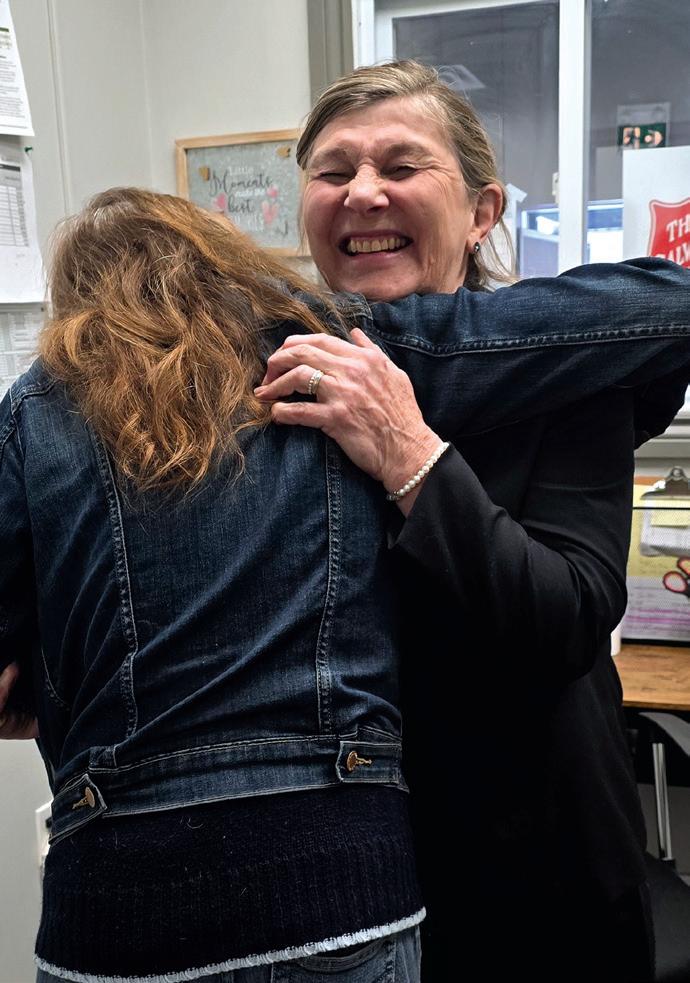
Three quarters said they faced challenges with food security. While purchasing discounted food items or shopping at discount retailers was the most common coping strategy, a notable 44 percent were cutting back on their groceries to pay other bills and stretch their money for the month, and 26 percent said they were skipping or reducing the size of meals—up from 21 percent in October 2023. One quarter also said they were eating less so their children or other family members could eat.
“It’s no secret that many Canadians are feeling increasingly squeezed by factors beyond their control,” says Lt-Colonel John Murray, territorial secretary for communications at The Salvation Army. “We have more families seeking assistance than ever before, and we’re acutely aware of the impossible choices they’re having to make.”
There has also been a “significant shift” in the types of clients seeking out The Salvation Army’s services since the pandemic, Lt-Colonel John says, with a far greater share of firsttime users, particularly families and single parents.
The Salvation Army is one of Canada’s largest direct providers of social services. Last year alone, it provided more than 5,500 shelter beds and distributed 3.2 million meals across the 400 communities in which it operates. It also helped 2.1 million Canadians with essen-
tials, including food and clothing. By the time people show up at The Salvation Army, they’ve often already had to make “impossible choices” to stretch their limited resources, and some are dealing with the “very real possibility of being made homeless,” all of which take a major toll on their physical and mental health, Lt-Colonel John says.
He says The Salvation Army is working to reduce poverty through programs that help them overcome barriers to employment and stable housing.
“Amazing Partners”
In addition to its food banks, thrift store and shelter services, The Salvation Army runs a wide range of social services programs, including substance-use rehabilitation, afterschool programs and camps, school nutrition programs, life skills and more.
Its Pathway of Hope program provides support from a dedicated caseworker to Canadians trying to achieve goals, such as getting their driver’s license, finding stable housing, earning their high school diploma, enrolling in a college or university program, or regaining custody of a child. Graduates of the program are paired with a mentor who can continue to support them.
“We see people are making steps and we help them continue up that ladder. It’s been smashingly successful,” says Major Mary.

“We have more families seeking assistance than ever before, and we’re acutely aware of the impossible choices they’re having to make.”
LT-COLONEL JOHN MURRAY
112,000
3 school meals provided
438,000
Visits to community and family services for food and nonfood services such as school supplies and baby products
1.1 MILLION
Shelter, addictions, detox, and mental health beds provided each night
5,500
1,158 long-term care and supportive housing beds provided visits for Christmas assistance including food hampers and toys
170,952 community meals were distributed
3.2 MILLION nutritional snacks and other food items provided
Source: The Salvation Army
She notes that many people who turn to the organization feel ashamed of their circumstances and of needing help, and staff work to make them feel welcome, valued and supported.
Support from philanthropic partners has been crucial to The Salvation Army’s work, Lt-Colonel John says. In Wiarton, grants, donations and partnerships with other agencies have powered crucial social services, including a dental
Reprinted from The Globe and Mail, November 15, 2024 visits made to The Salvation Army in Canada and Bermuda for assistance
clinic, back-to-school backpack program for children, food hampers for families, summer camps and literacy programs for children, and the organization’s community garden.
“We have some amazing partners,” Major Mary says. “It’s one of the reasons we can do as much as we do.”


by Giselle Randall

HUGAXAT WIL LUUT’AAYY. Although Erica Greenham didn’t know the words, she understood their meaning. Damian Azak was on bended knee, holding a ring. She said yes.
Erica is from Twillingate, N.L., a small coastal town.
“It’s just cliffs and ocean and wind,” she says. She remembers her childhood as magical, with loving parents, lots of outdoor adventures and family and friends around the table. As a sixth-generation member of The Salvation Army, she was involved in many traditional church activities. While studying at Memorial University of Newfoundland in St. John’s, N.L., she was part of the Army’s student fellowship, where she knew people who had worked at The Salvation Army’s Camp Mountainview in British Columbia.
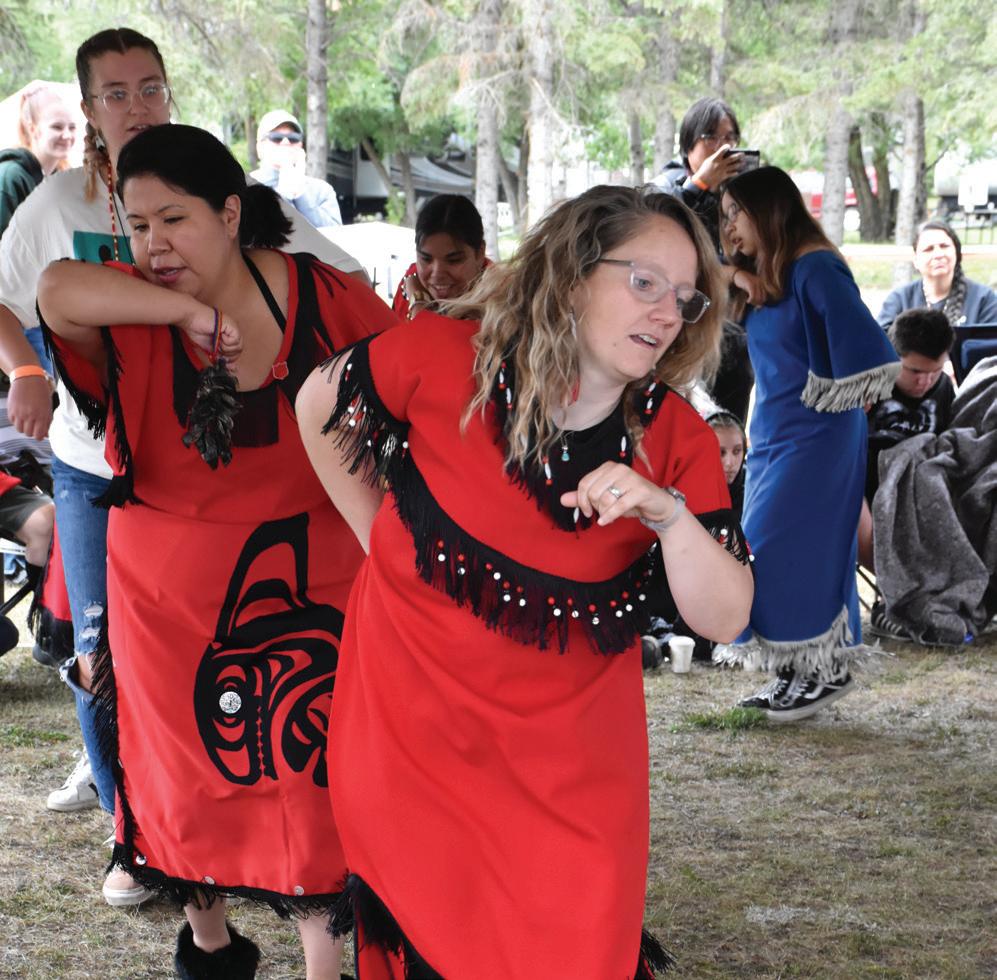
“I filled out an application because I had never seen a mountain,” she laughs, remembering her motivation for seeking a summer job on the west coast of Canada. She already had another job lined up when she was offered a position at Camp Mountainview.
“It made no sense, but I said yes,” she says.
Damian is from Gitwinksihlkw, a Nisga’a village in the Nass River valley of northwestern British Columbia, where he was raised with the cultural values of Sayt-K'ilimGoot (of one heart)—the philosophy of the common bowl. He also grew up in The Salvation Army, which is an integral part of the community. As a young adult, he faced the serious consequences of alcohol
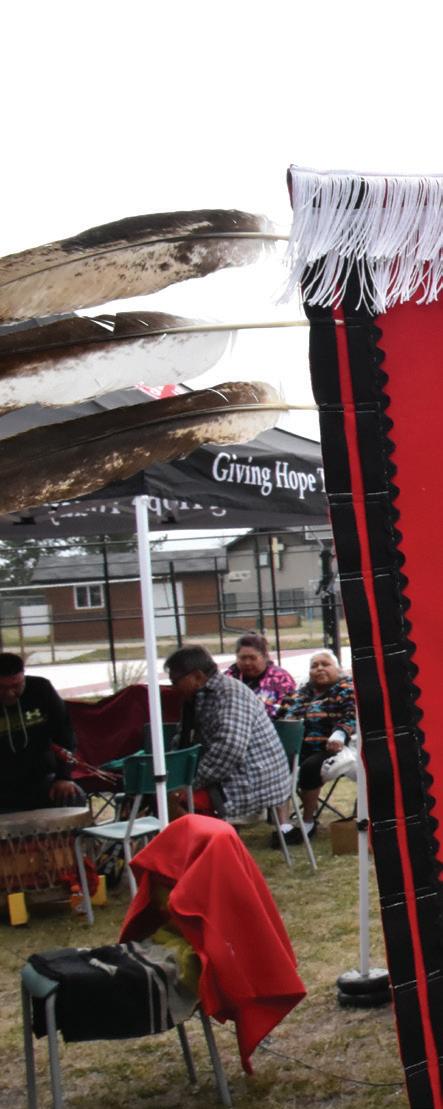
abuse, but turned his life over to God.
“Since then, I’ve been on a journey with the Creator and Jesus,” he says.
In 2002, Damian accepted a position at Camp Mountainview, and met Erica.
It wasn’t love at first sight. When they first met, Erica was sick, tired and a little overwhelmed from travelling across the country to work at Camp Mountainview for the summer—and her name was spelled wrong on the welcome sign Damian was holding at the airport.
Still, as they spent time together over the next few months, a friendship started to grow.
“I’ve worked at a lot of different

camps over the years, and that summer’s staff stands out as a group that really connected, encouraged and supported each other,” says Erica. “There weren’t any sparks with Damian, but I liked being around him. He was caring and always himself.”
“We were both into hockey,” Damian remembers. “She’s beautiful and just fun to be around.”
When Erica returned to Newfoundland and Labrador at the end of the summer, they stayed in touch.
“I think I always knew he was going to be important in my life,” Erica recalls. “We’re very different people, but it didn’t matter—because it
always felt like family. It always felt like home.”
A few years later, when Erica decided to return to university for a teaching degree, she chose the University of Northern British Columbia in Prince George.
Damian was working in Gitwinksihlkw, but often drove eight hours one way to spend time with Erica and other friends on the weekend.
“It was worth it,” he says, smiling. Eventually, he asked her on a date. He proposed in 2008, with words in the Nisga’a language: Hugaxat wil luut’aayy (It feels like home to me).
After getting married, Erica and Damian lived in Terrace, B.C.,

Happy Family
Damian and Erica, with Tory and Judy. “I wouldn‘t be who I‘m supposed to be without him,” says Erica of Damian. “He‘s taught me a lot about love”
ERIKA Welcome!
Damian holding his misspelled airport sign
for a couple of years, then returned to Camp Mountainview as leaders. Around this time, they started struggling with infertility.
“It was a difficult time in our lives,” says Erica. “I always wanted to be a mom. There were years of medical interventions and lots of heartbreak and frustration. Then we moved jobs and communities again. It was just struggle after struggle.”
Erica admits there were times when she was angry with God,

especially when she saw children in harm’s way.
“I knew children and families where things weren’t great—and I thought, How is this OK , God?” she says. “What God said to me was, You care for what I’ve entrusted to you. So, whether it’s kids at camp or kids I work with in the community, I care for them and love them as best I can, as God calls me to. I trust the rest of it to God, believing that He loves children more than I do.”
“When you’re not sure if your partner is going to live, or how long they’re going to live … it made me realize how precious life is, and to just cherish every moment.”
ERICA AZAK
In 2013, they moved to Gitwinksihlkw to lead the Salvation Army church. Soon after, Tory came into their lives and, later, Judy.
“When there were children in our extended family who needed a home, they came to live with us,” says Erica. “Tory calls us Auntie and Biip (uncle). Judy calls us Mom and Dad. When I look at our two girls, having them in our lives is miraculous.”
In 2021, Damian was diagnosed with sarcoma, a rare form of cancer, in his left leg. They spent five weeks in Prince George, along with many trips to Vancouver, for treatment and surgeries. For a year afterward, he needed a walker.
Says Erica, “When you’re not sure if your partner is going to live, or how long they’re going to live … I know it’s cliché, but it made me realize how precious life is, and to just cherish every moment.”
During this time, one of the things that sustained her was getting out on the land to connect with God.
“Things I prayed for, I saw answered,” she says. “I felt God’s presence the whole way.”
Damian has now been cancerfree for three years. As he looks back on his life, he sees God at work.
“Cancer is not a blessing, but being in Prince George meant we were able to spend time with Judy before bringing her home,” he says. “God is in every part of my life, bringing good out of bad.”
Erica describes Damian as the greatest gift of her life.
“I wouldn’t be who I’m supposed to be without him,” she says. “He’s taught me a lot about love.
“Scripture tells us that God doesn’t change, love doesn’t change—and Damian exemplifies that. Through everything—job difficulties, infertility, cancer—as well as all the good things, such as our girls coming into our lives, no matter what’s going on, his love remains steadfast.
“It’s just home.”
Better Times Than These Ian Knight and his mother, Katharyn

by Giselle Randall
When the doorbell rang that night at 9 p.m., Ian Knight had an uneasy feeling.
It was a Sunday evening in December, and he and his wife, Meagan, had already settled their one-year-old daughter into bed.
Life was busy. An outreach worker at The Salvation Army’s Gateway, an emergency shelter in Toronto, Ian was on the front line in responding to the early months of the COVID-19 pandemic. He had also been caring and advocating for his mother, Katharyn, who was in declining health. There was a gift under their Christmas tree for her—a beautiful blanket, because she was often cold.
As he opened the door and saw a police officer, his heart sank. He knew immediately that it was about his mom.
Sad News
Ian grew up in Oshawa, Ont., in a
rough part of town, with poverty, addiction and mental-health issues all around him. His parents divorced when he was young, and his mother was later diagnosed with schizophrenia. For many years, he was estranged from most of his family. But when his older brother, Jonathan, became a Christian in his university years, Ian saw a change in him.
“I saw how broken relationships were repaired,” Ian says. “I wanted something different. I wanted peace.”
Over time, he began his own journey of faith and became part of Sanctuary, a church and community in Toronto that seeks to share life with people who are poor and marginalized. From there, he joined The Salvation Army’s Gateway as a front-line worker. For the past several years, he has been part of the outreach team, caring for people who live outside.
“It means meeting people where they are, whether it’s a tent in a park, under a bridge, in the woods or at Tim Hortons,” he says. “Our focus is to find people and help them with housing. Some don’t want help, so we just offer community and friendship.”
But when the pandemic hit, the team was called back to the front line of shelter work. And with a new baby, born just a few months earlier, life was about getting through each day.
In September, he hadn’t been in touch with his mom for a while when his grandmother called.
“She said she was in bad shape,” he recalls. “She had always struggled with her mental health—she’d be good and then decline—and had diabetes. She wasn’t caring for herself and had lost close to a hundred pounds.”
Ian took her to the hospital, where she was stabilized and then admitted to a mental-health ward for a couple of weeks. But he knew that wasn’t enough—she couldn’t go back to her apartment.
“I’ve been in some really bad apartments through my work, and this was probably the worst I’ve ever seen,” he says.
She needed a safe place to stay while getting back on her feet, but shelter beds were in short supply. Although he found it difficult to ask for help, Ian felt God’s presence with
him as he spoke up on her behalf and with the support he received from colleagues.
“A bed came up the day we needed it,” he says. “Something like that—it’s God-given.”
By October, his mom was staying in a room overseen by The Salvation Army’s Florence Booth House, a shelter for women experiencing homelessness in Toronto. Ian saw her weekly to help with banking, doctor’s appointments or just for coffee. As they started to rebuild a relationship, they celebrated her birthday together, along with his brother, with pizza and cake.
“It was the first time in probably 15 years,” he says.
She was still underweight and struggling with her mental health. She didn’t say a lot, but she listened and nodded. She remembered many details and conversations from their childhoods. It was hard, and it was good.
And then the police came to his door one Sunday evening, about six weeks later.
“It was right out of a movie,” says Ian. “I just wish it wasn’t my story.”
The police told him that his mother had passed away early that morning, found by shelter workers as they dropped off breakfast. She died of complications from diabetes.
“She was just too sick at the end,” Ian says. “Her body didn’t have time to catch up.”
“She passed away with dignity. She was found right away. It’s a deep, God-given comfort.”
IAN KNIGHT

It was devastating news, especially since they had just started reconnecting. With pandemic restrictions and no vaccine, she hadn’t even met his daughter yet. But he took comfort in the way the last few months of her life unfolded.
“I knew where she was. I knew I could get a hold of her if I needed to. I knew she was safe, that she would be eating healthy meals,” he says. “I’m forever grateful to The Salvation Army for her receiving that care until she died.”
He knows things could have been different.
“If she had died at home, it could have been weeks before she was found, with her living situation the way it was,” he says. “She passed away
with dignity. She was found right away. It’s a deep, God-given comfort.”
It took Ian time to recover from the stress of this difficult season and to grieve his mother’s loss. Part of the healing process has been for him to tell the story and celebrate her life, even though it wasn’t always an easy relationship.
In his early years of working with people experiencing homelessness, Ian attended a conference where a spoken-word artist described this vocation as “messy, and beautiful.”
It’s how he describes this time in his life, too. It was tragic, hard and God was there.
“It was really messy, but beautiful.”

In theatres March 21, Snow White is a live-action reimagining of Walt Disney’s 1937 animated film, Snow White and the Seven Dwarfs.
Snow White (Rachel Zegler, West Side Story) is a beautiful young princess who shows kindness to everyone. After her mother dies, her father, the king, remarries a coldhearted woman (Gal Gadot, Wonder Woman). Not long after, her father dies unexpectedly, leaving her in the care of her stepmother, the Evil Queen, who is desperately jealous of Snow White’s beauty.
“Mirror, mirror, on the wall, who is the fairest one of all?” the Evil Queen asks her talking mirror each morning. When the mirror responds
This Easter, Snow White is a reminder that one day, our Prince will come.
by Diane Stark
with her stepdaughter’s name, the Evil Queen decides that Snow White must die. Snow White flees into the woods, where she meets and befriends the seven dwarfs.
Snow White is happy living with the dwarfs, but she is worried for her people. Her father was a benevolent king, but the Evil Queen is heartless. “This was my father’s kingdom, but the queen changed everything,” Snow White says. “The queen stole everything from all of us. It’s time to restore our kingdom.”
But to do that, Snow White will not only have to contend with her stepmother’s trickery and cruelty but with a poisoned apple that could spell her very end.
Snow White is not the first story in which an apple gets people into trouble.
Thousands of years ago, God created Adam and Eve, and He intended for them to live in the Garden of Eden and commune with Him every day. Everything was perfect until Adam and Eve broke the only rule God gave them. A serpent convinced Eve to eat an apple from the Tree of the Knowledge of Good and Evil, and then Eve gave it to Adam to eat.
The decision introduced sin into the world, and that changed everything. Adam and Eve had to leave the garden and were not allowed to return. Falling for the serpent’s scheme—one bite of forbidden fruit—cost Adam and Eve the beautiful life God had intended for them. That one sin created a rift between God and man.
Just as Snow White couldn’t change her situation after she ate the poisoned apple, there was nothing we—as flawed human beings— could do to repair the damage our sin had caused. But despite that, God still loved us and wanted a relationship with us. This meant that He had to bridge the gap with the ultimate act of love.
But it wasn’t a kiss from a prince, as in Snow White. No, fixing our sin problem required a sacrifice from the only perfect person who ever lived. The Prince of Peace, God’s only Son, Jesus, died a violent, painful death on a cross. It was a punishment that we deserved, but He took it on our behalf.
“The queen stole everything from all of us. It’s time to restore our kingdom.”
SNOW WHITE
Jesus died and then rose from the dead three days later. His Resurrection defeated death and sin and created a path back to God for each of us. All we have to do is accept Jesus’ sacrifice on the cross. When we do, God gives us a clean slate. It’s like our sin is erased and never happened. Because of Jesus, we can have a relationship with God and spend eternity with Him in heaven.
Our own Prince washes away our sins and leaves us white as snow (see Isaiah 1:18).

TIME 1 hr MAKES 6 servings SERVE WITH salad

30 ml (2 tbsp) olive oil
250 ml (1 cup) yellow onion, chopped
500 ml (2 cups) carrot, chopped
500 ml (2 cups) celery, chopped
2 garlic cloves
500 ml (2 cups) white potato, peeled and diced
250 ml (1 cup) yellow split peas
250 ml (1 cup) green split peas
5 ml (1 tsp) dried thyme
2.5 ml (½ tsp) dried marjoram
2.5 ml (½ tsp) salt
2.5 ml (½ tsp) black pepper
1 bay leaf
2 L (8 cups) low sodium vegetable broth
250 ml (1 cup) sliced ham
30 ml (2 tbsp) fresh parsley
500-750 ml (2-3 cups) croutons
1. Add olive oil, onions, carrots and celery to a large pot or Dutch oven and sauté for 4 minutes. Add garlic and potatoes and sauté together for another minute.
2. Add peas, thyme, marjoram, salt, pepper and a bay leaf and sauté together for a minute.
3. Add broth and bring to a boil over medium heat. Reduce to a low simmer and continue to cook for 50 minutes.
4. Remove lid from soup, add ham and continue to cook while stirring for 5 minutes.
5. Garnish with fresh parsley and croutons.
TIME 5 min MAKES 4 servings SERVE WITH split-pea soup

37 ml (2½ tbsp) rice vinegar
45 ml (3 tbsp) orange juice
5 ml (1 tsp) maple syrup
60 ml (¼ cup) olive oil
750 ml (3 cups) green cabbage, shredded
250 ml (1 cup) purple cabbage, shredded
125 ml (½ cup) carrot, shredded
2.5 ml (½ tsp) salt
2.5 ml (½ tsp) black pepper
1. Combine vinegar, orange juice and maple syrup in a bowl and whisk. Slowly add in olive oil while whisking.
2. Add green and purple cabbage, carrots, salt and black pepper, and stir to mix well.



GLASS
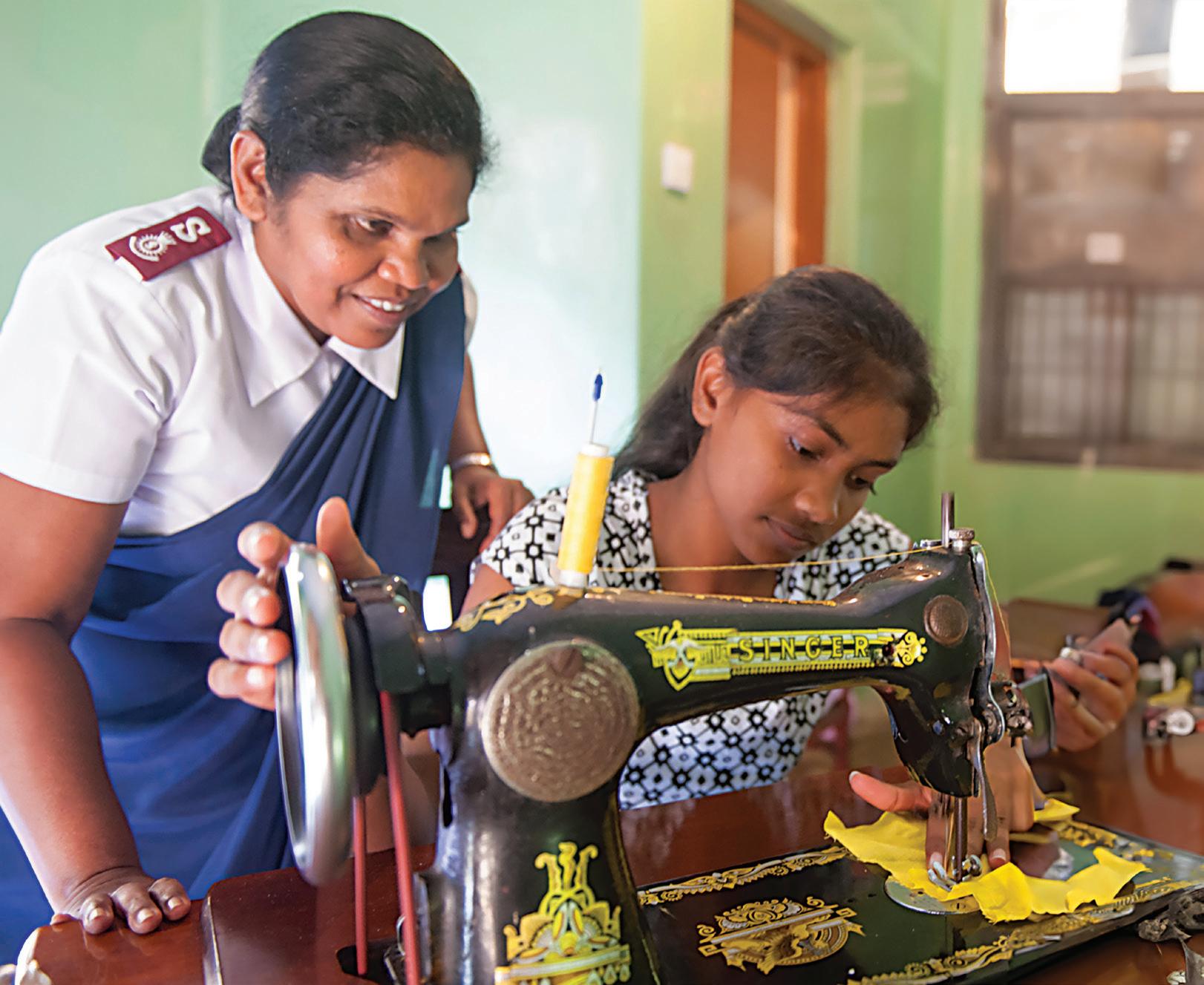
Major Mary Ratnasingh, a Salvation Army social services officer, at work with a woman in Sri Lanka. The Salvation Army’s vocational training programs equip individuals with essential skills, such as sewing, that help them enter the employment market. Through this training, youths and adults can earn a sustainable income, providing a fresh start for themselves and their families.
People across Canada continue to struggle to meet basic needs. More than half of food bank users are accessing services for the first time. Parents are especially affected, often cutting back on food to ensure their children are fed.
The Salvation Army is one of the largest non-governmental direct providers of social services in Canada. With your support, neighbours in need can have reliable access to food and safe shelter.
Make a life-changing difference today.
Visit SalvationArmy.ca or call 1-800-SAL-ARMY to donate.
